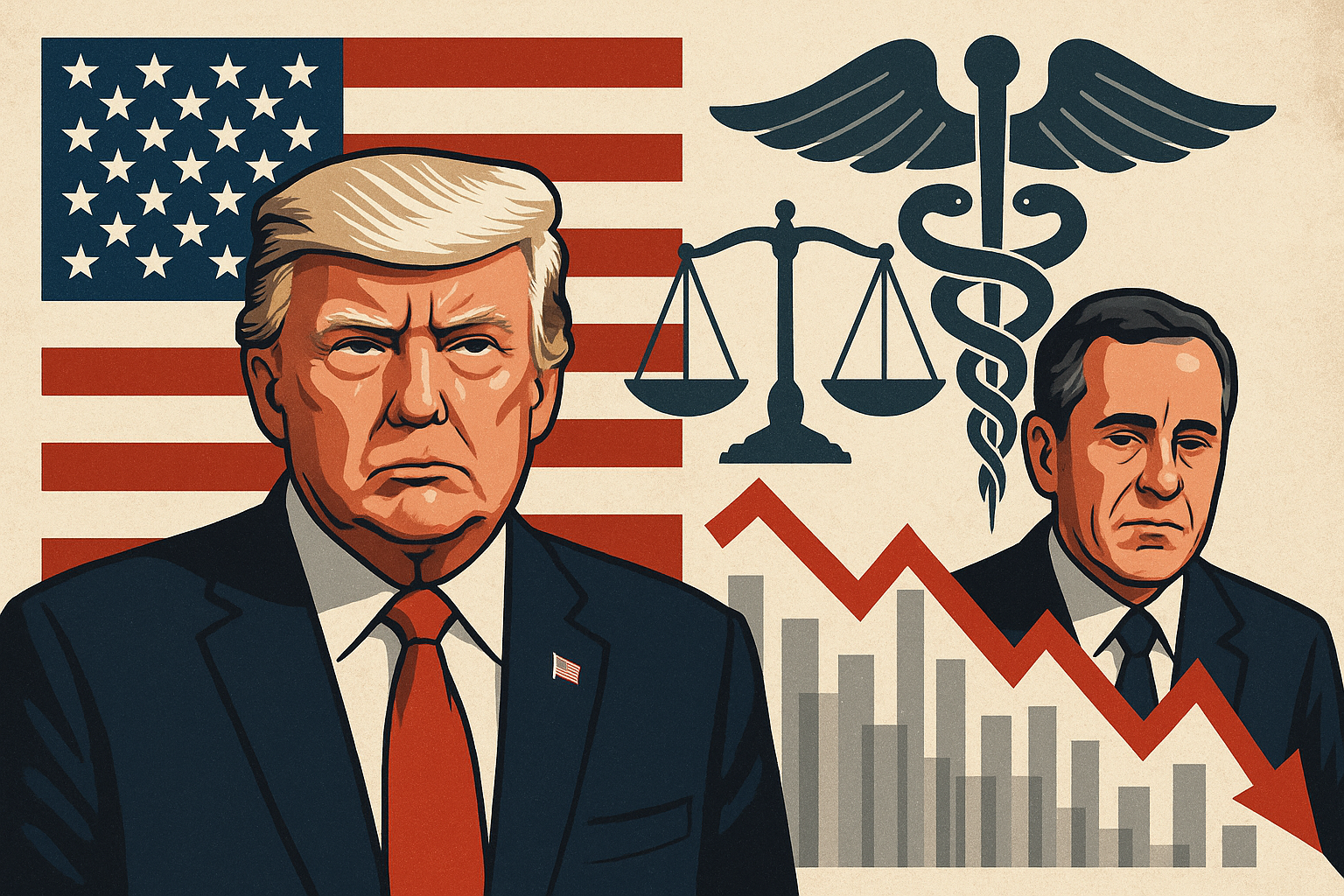As legal headlines collide with sweeping healthcare reforms, investors are confronting renewed political risk from Washington. On July 30, the Trump administration urged the judiciary to unseal grand jury testimony tied to the Jeffrey Epstein–Ghislaine Maxwell investigation, amplifying public scrutiny of elite networks and reviving high-profile legal uncertainties. At the same time, a $1 trillion federal reduction in Medicaid—the largest such cut in U.S. history—has intensified public backlash and introduced new volatility signals for healthcare-linked assets.
These developments come as Medicare marks its 60th anniversary, fueling an emotionally charged narrative in U.S. politics—just months ahead of the November elections.
Why This Matters for Investors
The confluence of legal controversy and public healthcare retrenchment adds multiple layers of uncertainty to U.S. markets. While investors are accustomed to political noise, this week’s twin moves by the Trump administration could materially influence sentiment in both healthcare and legal-regulatory sensitive sectors.
According to The Guardian’s July 30 live reporting, Trump’s Justice Department formally backed the release of sealed Epstein grand jury records, a move widely viewed as politically motivated amid broader calls for transparency. Simultaneously, the White House greenlit a $1 trillion reduction in Medicaid spending—nearly 27% of the program’s current projected five-year outlay—sparking protests across key swing states.
Both moves may appear unrelated on the surface, but together they underscore a governance style marked by aggressive policy disruption and legal overtones—raising red flags for long-horizon institutional investors.
Legal Shockwaves Could Reverberate Across Wall Street
The Epstein-related move may rekindle market anxieties around elite scandals, especially if released testimony implicates high-profile individuals in corporate, philanthropic, or financial circles. Legal exposure—even speculative—can impact brand equity, consumer sentiment, and boardroom stability for publicly traded firms indirectly tied to ongoing investigations.
Historical precedent suggests such legal developments can create ripple effects. For example, past revelations in large-scale investigations (e.g., Panama Papers, Enron) have occasionally triggered short-term sell-offs in exposed sectors. Hedge funds and high-net-worth portfolios may shift allocations to avoid proximity risk.
Medicaid Cuts Ignite Healthcare Sector Volatility
The larger and more immediately material threat to markets stems from the administration’s Medicaid overhaul. The proposed rollback disproportionately affects hospitals, managed care providers, and Medicaid-reliant insurers such as Centene Corp. ($CNC), Molina Healthcare ($MOH), and Elevance Health ($ELV).
According to a Kaiser Family Foundation (KFF) analysis published July 29, nearly 80 million Americans are currently enrolled in Medicaid—a record high. Slashing federal support by $1 trillion will likely shift cost burdens to states, increase uninsured rates, and alter payer dynamics for hospitals and providers.
Markets have already begun to respond: the Health Care Select Sector SPDR Fund ($XLV) slipped 1.2% in intraday trading, while Medicaid-heavy insurers saw even sharper drawdowns.
Future Trends to Watch
- Election-Year Policy Volatility: The dual focus on legacy scandals and social safety net rollbacks hints at a high-stakes election strategy, and investors should prepare for intensified policy headlines.
- Healthcare Regulation Repricing: Regulatory risk premiums are rising for U.S. healthcare equities. Watch for earnings guidance downgrades from companies with Medicaid-heavy customer bases.
- Legal Risk Contagion: If the Epstein documents are released and implicate individuals tied to publicly traded firms, expect legal and reputational fallout. Media attention may move faster than courts or regulators.
- State Budget Fallout: States may respond to Medicaid funding shortfalls with tax increases or bond issuances, creating ripple effects in municipal debt markets.
Key Investment Insight
Heightened political and legal volatility underscores the need for sector-selective strategies. Investors should:
- Consider rotating away from Medicaid-dependent insurers and providers in the near term.
- Track legal news flow for potential exposure risks in luxury, philanthropy, and financial sectors.
- Watch muni bond yields from states with heavy Medicaid enrollment (e.g., California, Texas, Florida) as budget stress mounts.
A neutral-to-defensive stance in healthcare, with increased exposure to diversified large-cap pharmaceuticals and global health ETFs, may offer relative safety.
For daily investor insights grounded in credible, up-to-the-minute reporting, follow MoneyNews.Today—your trusted source for smart, market-moving news.





